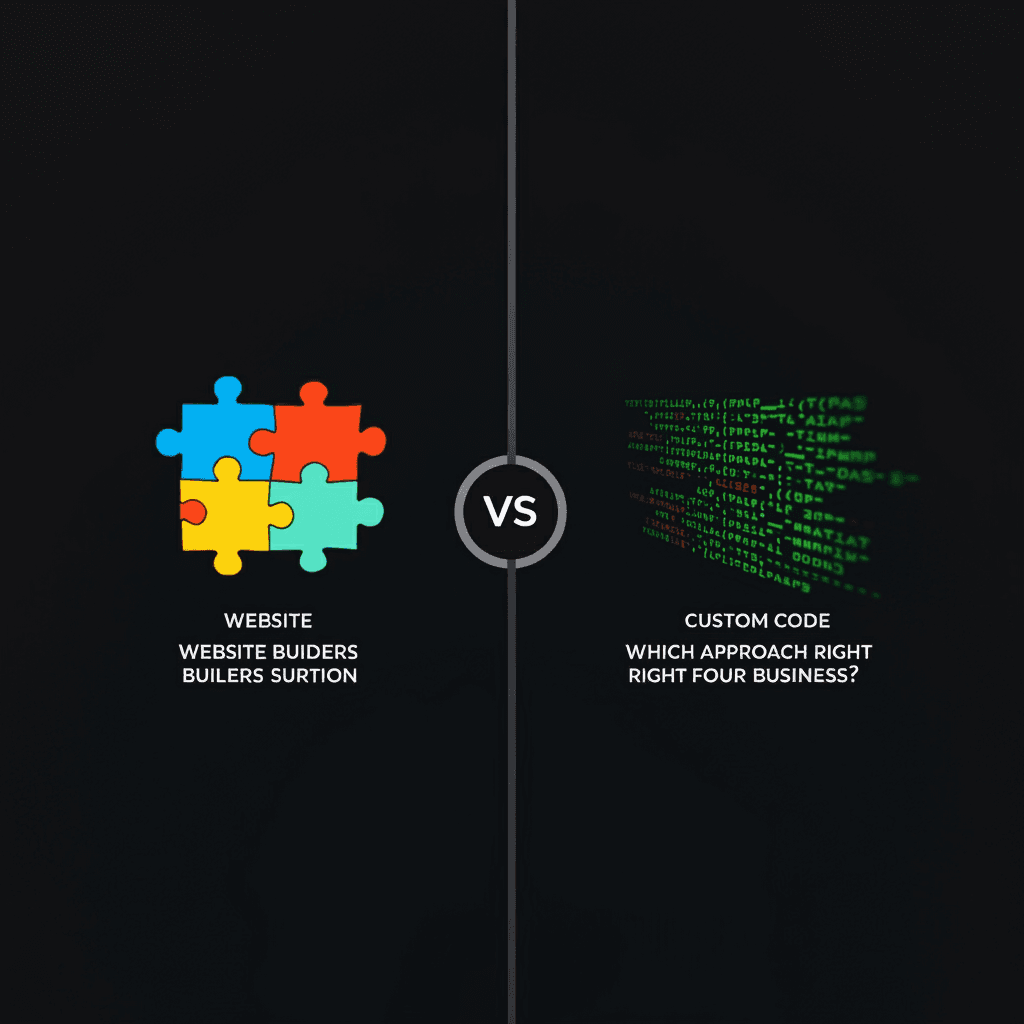Oct 28, 2024
Website Builders vs. Custom Code: Which Approach Is Right for Your Business?
In the digital age, having a compelling, functional website is crucial for any business. When deciding to create a website, businesses often face a significant choice: using a website builder or writing custom code. Both methods have unique strengths, drawbacks, and ideal use cases, so understanding each approach can help businesses make the right decision for their needs and goals. Here’s an in-depth look at each option to help guide this choice.
Website Builders: Simplicity and Speed
Website builders are platforms like Wix, Squarespace, and WordPress (with themes), which provide a range of pre-designed templates, drag-and-drop interfaces, and integrated features like eCommerce tools and SEO. Website builders are popular for businesses looking for fast and easy website setup without the technical knowledge required for coding.
Key Use Cases for Website Builders
Small businesses, freelancers, or startups with limited budgets and minimal technical resources.
Personal or portfolio sites where showcasing content simply and quickly is a priority.
Temporary sites or landing pages that don’t require heavy customization.
Businesses needing quick prototyping to establish an online presence before investing in a custom site.
Advantages of Website Builders
Ease of Use: Most website builders offer intuitive interfaces, often with drag-and-drop features, making them accessible to users without a technical background.
Quick Deployment: Building a site with a website builder is fast, often allowing businesses to launch in hours or days instead of weeks.
Lower Cost: Website builders often come with affordable subscription plans, and their ready-made features reduce the need for custom development expenses.
Maintenance & Security: Builders handle regular updates, hosting, and security patches, relieving business owners from these responsibilities.
Integrated Features: Many builders come with built-in features for SEO, analytics, and eCommerce, simplifying the process of adding functionalities to a site.
Drawbacks of Website Builders
Limited Customization: While many website builders offer customization options, they’re limited to the platform’s framework. For businesses with unique needs, this can be restrictive.
Performance Limitations: With heavy reliance on plugins or a high volume of traffic, performance can suffer, affecting loading speeds and user experience.
Lack of Full Control: Since the website is built on a platform’s infrastructure, users are subject to the platform’s rules, restrictions, and pricing changes.
SEO and Scalability Limitations: While most website builders have basic SEO capabilities, they may lack advanced optimization options. Additionally, as the business grows, some builders may not scale well with more complex needs.
Custom Code: Flexibility and Functionality
Writing custom code involves building a website from the ground up using programming languages like HTML, CSS, JavaScript, or a framework like React or Django. This approach is far more involved but offers complete control over every detail of the website’s design, functionality, and user experience.
Key Use Cases for Website Builders
Large businesses or eCommerce sites that require highly customized features or advanced functionalities.
Companies focused on branding and differentiation, where a unique look and user experience are key.
Web applications or platforms with complex back-end requirements, such as user accounts, data processing, or complex animations.
Businesses prioritizing scalability and flexibility, needing a foundation that will grow with their needs.
Advantages of Website Builders
Complete Customization: Custom-coded websites allow for unique designs and functionalities tailored specifically to the business’s needs and branding.
Enhanced Performance: A custom-coded website can be optimized for performance, eliminating unnecessary code and focusing only on required features, resulting in faster load times and a better user experience.
Scalability and Flexibility: Custom-coded sites are inherently flexible, able to grow and adapt as the business evolves, without the limitations imposed by a platform.
Advanced SEO Optimization: Developers can implement more advanced SEO strategies, optimizing technical aspects like page load speed, mobile friendliness, and schema markup.
Full Control and Ownership: Custom code provides complete control over the site, eliminating reliance on third-party platforms and allowing businesses to adapt their site as needed.
Drawbacks of Website Builders
Higher Cost and Time Investment: Custom development typically requires hiring skilled developers, which can be costly. Building and deploying a custom site also takes significantly more time compared to using a website builder.
Ongoing Maintenance and Updates: Unlike website builders, custom-coded sites require regular maintenance and updates to ensure compatibility, security, and performance, adding to ongoing costs.
Technical Complexity: Managing a custom-coded website requires technical knowledge, either in-house or through external support, to troubleshoot, update, and scale the site.
Security and Compliance: Custom sites require active security management, such as SSL certificates, data protection measures, and GDPR compliance, which website builders often handle automatically.
Choosing the Best Approach Based on Business Needs
Choosing between a website builder and custom code depends on a few key factors: business goals, budget, timeline, and future growth.
For Small Businesses and Startups with Limited Resources
A website builder is often the best choice for businesses that need a quick, affordable, and professional-looking site. Website builders offer just enough customization and functionality to meet the needs of a new or small business. Plus, they handle most of the technical aspects, so the business owner can focus on core operations instead of web development.
For Growing Businesses Focused on Branding and Customization
As businesses grow, they may want a unique online presence that stands out from competitors. Custom code is ideal for companies seeking advanced branding or functionality that isn’t possible with a website builder. This investment can lead to improved customer engagement, better brand recall, and an overall professional image.
For Large-Scale or Complex Sites with Long-Term Goals
Custom code becomes necessary for businesses needing advanced features, high traffic handling, or complex back-end functionality. These include eCommerce businesses with large product catalogs, social networks, or SaaS platforms where user experience and scalability are critical.
For Testing Ideas or Temporary Projects
When launching a temporary site, campaign, or prototype, website builders are ideal. They allow businesses to set up fast, test their concept, and minimize costs until the idea proves successful enough to invest in custom development.



